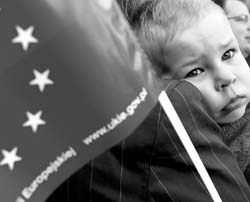Europe as a Task

For me as Prime Minister of the Czech Republic, Europe has a meaning that goes far beyond geography. It is a synonym for a new beginning, new hope, the rule of the “better me” that exists in all of us. It’s an expression of prosperity, progress, and justice. Perhaps these words sound exaggerated to cynical ears. But they clearly express the changes that Europe has witnessed over the past half-century, changes for the good that all Czechs now want to secure for themselves, having been denied the fruits of European peace and prosperity for so long.
Throughout its history, Europe saw countless bloody conflicts; peoples and states clashed, with the Czech lands often the bloody crossroads of these battles. The disasters of two world wars, and the half-century of Cold War, pushed Europe to embrace cooperation and integration in order to avoid another suicidal battle. Those far-sighted Europeans who set Europe on its road to peace through unification deserve our heartfelt appreciation.
Simply put, the idea of European integration transformed our continent. The open economic space and the principle of solidarity helped ensure that economically less developed countries that joined the European Economic Community and, later, the European Union, progressed at an astonishing pace, enhancing the living standards of their peoples. Nowadays, indeed, instead of deepening disparities in standards of living in Europe, which was the historic norm, differences are actually blurring as the quality of life everywhere in Europe rises.
Yet this prosperous and peaceful Europe is not idyllic; sometimes Europe is not at all an easy place for its citizens to live, as the tumultuous Balkan Wars and painful postcommunist transitions of the past decade demonstrated. But even in hard times, every European knows deep down that European integration has delivered peace with clear prospects for broadening Europe’s zone of peace and stability.
On the other hand, to secure that promise of peace and stability, Europeans must recognize that the Union is not and cannot be perceived as a work set in stone. The half-century of peace that integration has delivered involved constant changes. Today, we must also continue forming and correcting the EU to maximize its ability to reflect the needs of its inhabitants in an ever-changing world.
These changes, however, must always be undertaken in the light of core European virtues. Foremost among these, perhaps, is the Union’s open character. The European Union is neither closed nor static; it is a living organism. The European Union, as I grasp it, is primarily a process, leading from worse to better; a process with only one end — the continuous development of European prosperity and peace.
Indeed, it is vital to understand that Europe’s integration process is not mechanical but organic. It is not a machine that goes on of its own accord, but is instead something that must be lived and worked for by Europeans. For no one should be mistaken: there are alternatives to European integration — all of them bad, unwanted, and dangerous. Unless all Europeans remain devoted to integration and the creation of an open Europe, the Continent’s dark past may once again become its future.
There are a number of qualities that must be understood if integration is to continue to build an ever more open Europe. Voluntary self-restraint, a voluntary sharing of our own rights and privileges with a wider collective, is paramount here. While states once enforced their rights at the expense of others, they now transfer their rights in favor of others. The heart of this miracle is that it benefits all — Europe’s citizens, its states, the whole continent, and the world.
For states to voluntarily limit themselves is unique in human history. Europe’s states have been able to achieve this discipline primarily because they are democracies. Europe’s peoples have sanctioned limiting their own governments powers so as to achieve peace across Europe.
There would be no Union and no integration, were it not built on the principles of democracy. This is why, having regained their democratic regimes, Central and Eastern European countries unequivocally voted to join the continent’s integration process. This is why these countries associate the future of their democracies with ever-closer and more integrated cooperation with other European states.
Of course, democracy does not automatically mean integration. But without democracy, no genuine, fair, and universally beneficial integration would be possible. The people of the Czech Republic, like most Europeans, wish to jointly build an irreversible system of mutual relationships among states, regions, municipalities, and their inhabitants. Their desire is to eliminate violence and, at the same time, generate stable conditions for economic and social progress for everyone in Europe. The end of history may not be at hand in Europe, but the end of Europe’s dark history is clearly in sight — so long as Europeans continue on the path of integration.
Vladimir Spidla is Prime Minister of the Czech Republic.






